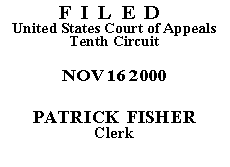

| TERRY ABBOTT,
Petitioner-Appellant, v. JOHN SOUTHERS and ATTORNEY GENERAL FOR THE STATE OF COLORADO, Respondents-Appellees. |
|
Petitioner Terry Abbott, a Colorado state prison inmate proceeding pro se,
seeks a certificate of appealability to appeal the district court's orders denying his requests to extend the deadlines for (1) responding to a show cause order and (2) filing a notice of appeal. Because we conclude Mr. Abbott failed to satisfy the requirements of Fed. R. App. P. 4(a), we deny a certificate of appealability and dismiss the appeal.
Mr. Abbott filed a petition for a writ of habeas corpus under 28 U.S.C. § 2254. The petition did not demonstrate that it was filed within the applicable statute of limitations. Therefore, on September 17, 1999, the district court ordered him to show cause within thirty days why his petition should not be dismissed. Thirty days passed, but Mr. Abbott did not respond. On November 1, 1999, the district court dismissed Mr. Abbott's habeas petition for failure to show cause. On November 10, 1999, Mr. Abbott filed a motion for leave to respond to the show cause order out of time. The district court denied that motion on November 22, 1999. On January 18, 2000, Mr. Abbott requested an extension of time to file a notice of appeal and a motion for a certificate of appealability. The district court denied that request on February 3, 2000. Thereafter, on March 2, 2000, Mr. Abbott filed a motion for a certificate of appealability, which the district court treated as a notice of appeal from the February 3 order.
Rule 4 of the Federal Rules of Appellate Procedure dictates which of the district court's orders we may review on appeal. Rule 4(a)(1) requires a notice of appeal to be filed within thirty days of the order being appealed. Rule 4(a)(5) permits the district court to extend the time for filing a notice of appeal if a request for an extension is filed within thirty days after the original thirty-day period. Here, Mr. Abbott filed a timely notice of appeal from only the February 3 order denying leave to file a late notice of appeal and a motion for certificate of appealability. We do not have jurisdiction over the district court's November 1, 1999 order dismissing the habeas petition because no notice of appeal was filed within thirty days, and no extension was requested within sixty days of the order. See Smith v. Barry, 502 U.S. 244, 245 (1992) ("Rule 3 of the Federal Rules of Appellate Procedure conditions federal appellate jurisdiction on the filing of a timely notice of appeal."); Fed. R. App. P. 4(a)(1), (5). Accordingly, we may not reach the merits of Mr. Abbott's habeas claims.
In order to obtain a certificate of appealability, Mr. Abbott must make a "substantial showing of the denial of a constitutional right." 28 U.S.C. § 2253(c)(2). A district court's decision to deny an extension of time to file a notice of appeal is ordinarily reviewed for an abuse of discretion. Ogden v. San Juan County, 32 F.3d 452, 455 (10th Cir. 1994). Therefore, Mr. Abbott must make a substantial showing that the district court in this habeas case abused its discretion in denying his motion for an extension of time. See Greenawalt v. Stewart, 105 F.3d 1268, 1276 (9th Cir.1997).
The district court denied Mr. Abbott's request for an extension of time to file a notice of appeal because it was filed outside the time limits of Rule 4(a)(5). Mr. Abbott wished to appeal from the November 1, 1999 dismissal of his habeas petition. His request for a late notice of appeal was filed January 18, 2000, more than sixty days later, beyond the maximum time permitted by Rule 4(a)(5). Mr. Abbott's November 10, 1999 motion for leave to respond to the show cause order out of time, denied on November 22, did not toll the time to request an extension for the notice of appeal, because it did not qualify as a tolling motion under Rule 4(a)(4). Accordingly, the district court did not abuse its discretion in denying the request for an extension of time to file a notice of appeal.
The request for issuance of a certificate of appealability is DENIED and the appeal is DISMISSED. The mandate shall issue forthwith.
Entered for the Court
Circuit Judge
*. This order and judgment is not binding precedent, except under the doctrines of law of the case, res judicata, and collateral estoppel. The court generally disfavors the citation of orders and judgments; nevertheless, an order and judgment may be cited under the terms and conditions of 10th Cir. R. 36.3.